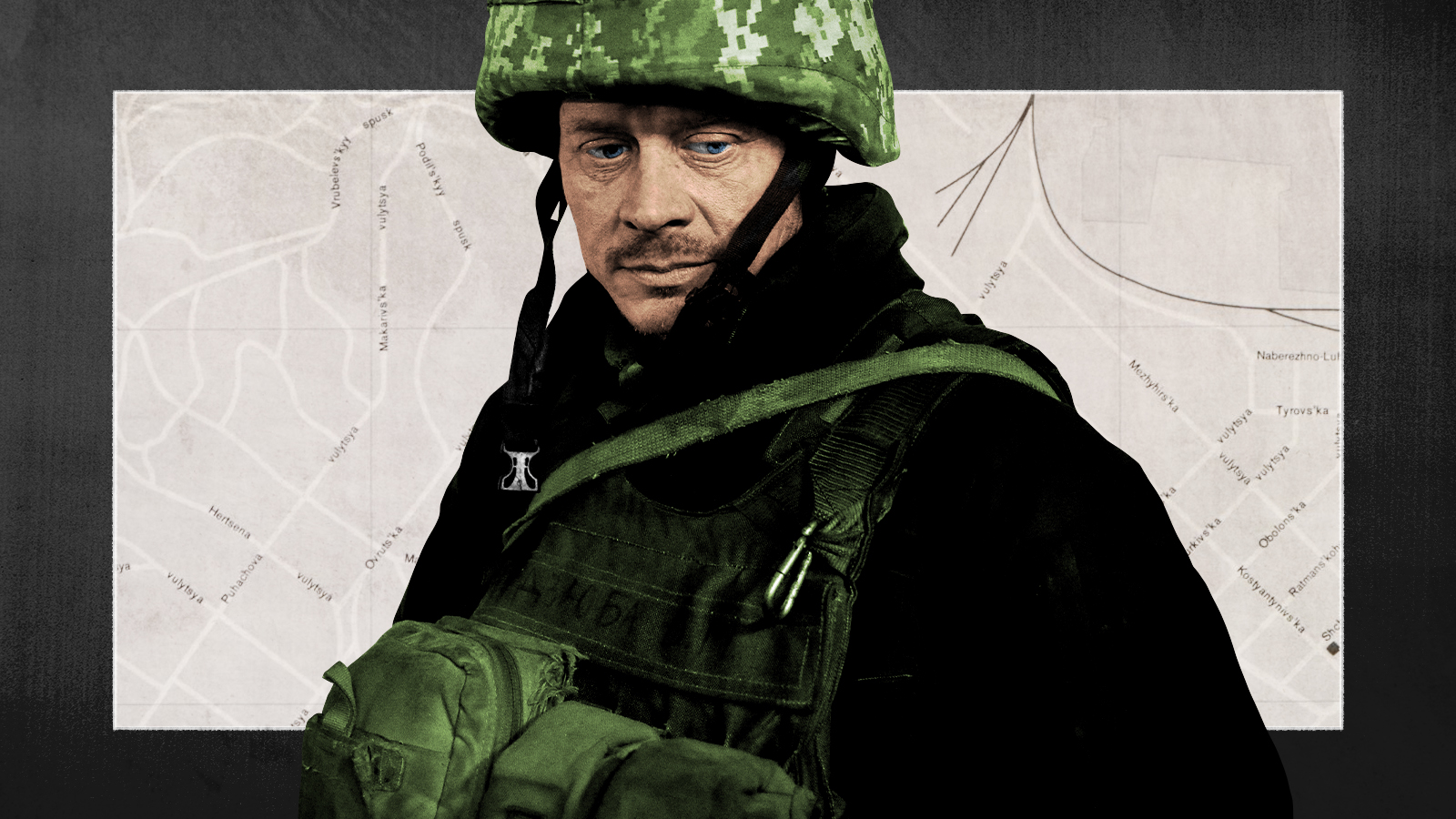Why a Ukrainian insurgency against Russia is likely to fail
No band of underground fighters can stand against Russian rocket artillery


A free daily email with the biggest news stories of the day – and the best features from TheWeek.com
You are now subscribed
Your newsletter sign-up was successful
The media has recently been full of stories of unlikely soldiers, including elderly Ukrainian citizens undergoing military training for the possibility of undertaking an insurgency against Russian occupation. No doubt, the idea was intended by Kyiv and its friends to deter a Russian invasion. However, few seem to have genuinely grappled with the details of what an insurgency in Ukraine would actually entail.
Unquestionably, the Ukraine armed forces are badly overmatched by Russian military might. Moscow has a plethora of capabilities that Kyiv does not, particularly in the air and missile domains. The Ukrainian army might be able to inflict some casualties with its new Western-supplied anti-tank weaponry, but these Ukrainian units will have difficulty maintaining cohesion when faced with an onslaught of Russian rocket artillery attacks, supplemented by drone surveillance. Indeed, the Ukrainian Army broke in disorder when confronted by Russian rocket artillery in March 2015 at Debaltseve.
At first glance, an occupied Ukraine would seem ripe for an effective insurgency. It not only has plenty of citizens who despise the Russian leadership, but it is also quite a large country with reasonably varied terrain, and also has borders with six different countries, aside from Russia. In addition, many have noted that a considerable number of Ukrainians now have combat experience, having spent time in the combat zone in and around Donbas.
The Week
Escape your echo chamber. Get the facts behind the news, plus analysis from multiple perspectives.

Sign up for The Week's Free Newsletters
From our morning news briefing to a weekly Good News Newsletter, get the best of The Week delivered directly to your inbox.
From our morning news briefing to a weekly Good News Newsletter, get the best of The Week delivered directly to your inbox.
For Americans, the insurgency option may have additional appeal due to recent experiences with insurgencies in both Afghanistan and Iraq. Yet, there are some basic differences between those situations and what might occur in Ukraine.
Fundamentally, the Russian and Ukrainian cultures are rather similar, whether in terms of language, culture, or history. To state the obvious, the Americans were hindered in both Iraq and Afghanistan, because none of these similarities existed. In other words, the acute cultural distance badly inflamed the insurgency in both places, since perceptions of the "occupier" could draw on a deeper well of xenophobia and "otherness" more generally.
Of course, the same dynamic fueled America's difficulties in Vietnam, as well as the Soviet experience in Afghanistan. In Ukraine, by contrast, the Russians with their cultural proximity to Ukrainians would likely be much more successful in both hunting down insurgents, but also in appealing to "normalcy" among the general population. The example of Crimea, where insurgency has been threatened from time to time, offers a clear and relevant example of where the dog has not barked, so to speak.
Another problem concerns the wider impact of an insurgency on European security, and on NATO, in particular. No doubt, in the event of a major war in Ukraine, all of the country's other neighbors will be badly afflicted, for example by major refugee flows.
A free daily email with the biggest news stories of the day – and the best features from TheWeek.com
Yet, it could get far worse for them.
Romania and Poland, for example, each now host NATO bases. In the case of insurgency, both countries are likely to become major corridors for weapons to be smuggled through to Ukrainian rebels. In that case, these countries are certain to become "front line" states in the new Cold War with all the attendant costs and risks.
Who can say, for example, whether an enraged Kremlin unable to stamp out an insurgency would not lash out with missiles or even tanks against either Romania or Poland in order to give them "a bloody nose."
Insurgencies require nearby sanctuaries, but Russia will not easily tolerate such sanctuaries, forcing an ever more dangerous game of 'chicken' with NATO. Nor is Moscow short on both tactical and strategic nuclear weapons in case this game of chicken were to escalate dramatically.
Finally, and most importantly, few of the armchair strategists now clapping enthusiastically for prospective Ukrainian resistance fighters will have ever seen an insurgency and all its human devastation up close. Such wars exceed conventional wars in their level of ferocity and cruelty, tearing apart previously heterogeneous societies whole cloth. Assassination, bombs, torture, surveillance, and the loss of thousands upon thousands of innocent lives are the hallmarks of such campaigns, which usually take decades to burn out.
It should also be said that Russians are not strangers to insurgency. Given what Russia has faced in Chechnya previously or in Syria more recently, the prospects are not good for the Kremlin to simply turn tail and accede to the previous status quo. Most likely, the Russian Army in Ukraine would limit an occupation to areas in eastern Ukraine that are culturally more pro-Russian, minimizing opportunities for insurgents.
It is hardly surprising that many Western strategists and media commentators have alighted on the insurgency. Appraising the above risks and the potentially enormous human costs to the Ukrainians themselves, a prospective Ukrainian insurgency may not be worth the "virtue signaling" of the many sincere well-wishers in the West, who wish to vent their frustration at Russia and its leaders.
Lyle Goldstein is the Director of Asia Engagement at Defense Priorities. He is also Visiting Professor at the Watson Institute for International and Public Affairs at Brown University.
-
 How the FCC’s ‘equal time’ rule works
How the FCC’s ‘equal time’ rule worksIn the Spotlight The law is at the heart of the Colbert-CBS conflict
-
 What is the endgame in the DHS shutdown?
What is the endgame in the DHS shutdown?Today’s Big Question Democrats want to rein in ICE’s immigration crackdown
-
 ‘Poor time management isn’t just an inconvenience’
‘Poor time management isn’t just an inconvenience’Instant Opinion Opinion, comment and editorials of the day
-
 Epstein files topple law CEO, roil UK government
Epstein files topple law CEO, roil UK governmentSpeed Read Peter Mandelson, Britain’s former ambassador to the US, is caught up in the scandal
-
 Iran and US prepare to meet after skirmishes
Iran and US prepare to meet after skirmishesSpeed Read The incident comes amid heightened tensions in the Middle East
-
 Israel retrieves final hostage’s body from Gaza
Israel retrieves final hostage’s body from GazaSpeed Read The 24-year-old police officer was killed during the initial Hamas attack
-
 China’s Xi targets top general in growing purge
China’s Xi targets top general in growing purgeSpeed Read Zhang Youxia is being investigated over ‘grave violations’ of the law
-
 Panama and Canada are negotiating over a crucial copper mine
Panama and Canada are negotiating over a crucial copper mineIn the Spotlight Panama is set to make a final decision on the mine this summer
-
 Why Greenland’s natural resources are nearly impossible to mine
Why Greenland’s natural resources are nearly impossible to mineThe Explainer The country’s natural landscape makes the task extremely difficult
-
 Iran cuts internet as protests escalate
Iran cuts internet as protests escalateSpeed Reada Government buildings across the country have been set on fire
-
 US nabs ‘shadow’ tanker claimed by Russia
US nabs ‘shadow’ tanker claimed by RussiaSpeed Read The ship was one of two vessels seized by the US military
